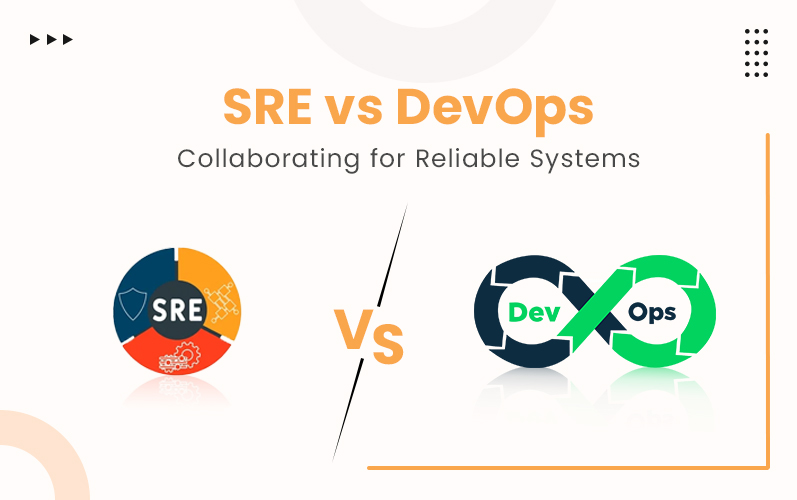SRE vs. DevOps is a frequent point of discussion in today's world of software delivery. They are not rivals; they go hand in hand to accelerate the workflow in an organization. DevOps optimizes CI/CD pipelines, which increases the software delivery speed. 87% of the organizations reported that DevOps practices ensure high-quality outcomes. Meanwhile, SRE emphasizes reliability and scalability. A report shows a 47% increase in system reliability and a 32% reduction in downtime after SRE inclusion. Together they balance speed and stability. DevOps team drives frequent and fast changes. While SRE makes sure these changes don't compromise uptime or user trust.
Key Takeaways
- DevOps and SRE collaborations guarantee faster software delivery with reliable system performance.
- SRE emphasizes automation, monitoring, and error budgeting.
- DevOps promotes CI/CD pipelines, communication, and feedback loops.
- Core principles of these two approaches help teams maintain stability.
- Combined SRE and DevOps approach balances rapid deployments with user trust assurance.
Understanding the Role of SRE
Site Reliability Engineering (SRE) is an assimilation of engineering practices and IT operations. Modern-day software companies include CRE to run operations smoothly and effectively. It emphasizes automation, proactive monitoring, and maintaining service-level targets to prevent failures. SRE teams focus on minimizing downtime and improving system performance. By combining operational expertise with software development techniques, they are managing incidents efficiently. Through continuous effort of the SRE team, organizations can resolve issues earlier. So, don’t just contemplate, what is SRE? Inclusion of site reliability engineers may provide smooth user experiences, hence increasing the reputation.
The Core Principles of SRE
- Service-Level Objectives (SLOs): SRE defines the performance expectations from software services. These objectives help the team to know the acceptable failure thresholds. It maintains the delivery process in one hand and user trust in the other.
- Error Budgets: Error budgets make a rough estimation of a defined number of failures. This maintains a balance between innovation and reliability.
- Automation: Automation is the essence of SRE. It reduces repetitive tasks and errors. It speeds up the deployment process while improving efficiency.
- Monitoring and Observability: Continuous monitoring and observability provide insights into system health. This allows proactive detection and rapid response to incidents before users are impacted.
- Blameless Postmortems: After failures, SRE promotes blameless postmortems to evaluate the root causes. It shares learning and ensures that the same mistake is not repeated. SRE makes improvements without penalizing individuals and fosters a culture of continuous improvement.
Understanding the Essence of DevOps
DevOps is a technical approach that unites software development and IT operations. The DevOps team mainly does this to deliver faster and more reliable software. DevOps is also a cultural procedure that emphasizes collaboration and automation. It streamlines workflows through continuous integration and continuous development (CI/CD) processes. The DevOps team shared the silos to reduce errors and guarantee consistent quality. Organizations adopting DevOps benefit from improved efficiency and quicker feedback loops. They have the ability to innovate rapidly while maintaining stable, high-performing systems.
The Core Principles of DevOps
- Continuous Integration & Continuous Development (CI/CD): CI/CD automates code integration and testing. This principle of DevOps enables rapid deployment with error-free releases.
- Infrastructure as Code (IaC): IaC manages infrastructure through codes. It automates provisioning, configuration, and scaling, thus creating a stable environment across teams.
- Collaboration and Communication: DevOps encourages seamless collaboration between development and operation teams. Through breaking silos, DevOps teams create a sense of shared responsibility. This enhances communication and reliable software delivery.
- Automation: DevOps minimizes repetitive tasks and reduces human errors. Testing and integration are done in every software stage. This accelerates the software delivery process while increasing efficiency.
- Monitoring & Feedback: DevOps monitors systems and applications continuously. The DevOps team detects issues at the budding stage, creating a feedback loop.
How Do They Work Together?
Nowadays, DevOps vs. SRE is the current debate. But in the software ecosystem, their collaboration can create an incomparable pair. When they work in parallel, they help the organization to reach the pinnacle of speed and reliability. DevOps focuses on fast and frequent delivery, whereas SRE focuses on system stability. DevOps creates a culture of shared responsibility by breaking down silos. SRE complements this by managing errors through automation and constant monitoring. Together they create magic in the software development process. Their combined approach brings a feedback-driven environment where innovation doesn't compromise performance. Companies that include these two teams can effectively reduce downtime. They will be able to see a visible change in the user satisfaction rate. SRE vs. DevOps assimilation also helps organizations to improve their incident responses. This proven collaboration drives both operational efficiency and business success.
How can The Tech Clouds (TTC) Help Your DevOps and SREs?
The Tech Clouds (TTC) empowers your teams to optimize both development and reliability. Our proficient engineers bridge the DevOps vs. SRE gap and strengthen system stability. With TTC, you can implement scalable CI/CD pipelines that streamline deployments. It supports automation, monitoring, and policy enforcement. TTC enables self-service provisioning, dependency management, and real-time insights into infrastructure health. By standardizing processes, your teams can innovate faster and achieve operational efficiency.
Book a demo with one of our engineers and see how TTC transforms your DevOps and SRE practices.



